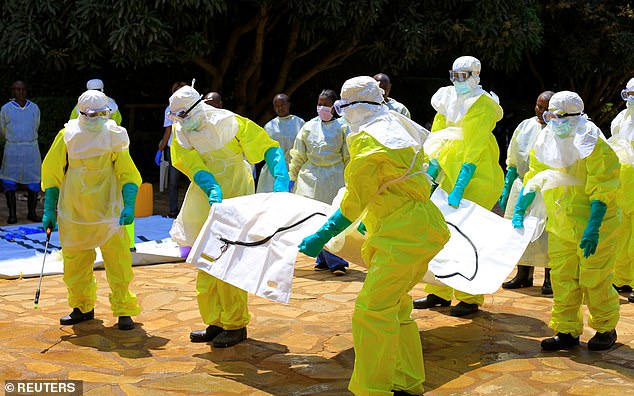A mystery illness being dubbed ‘disease X’ has infected more than 400 and killed dozens of children in the Democratic Republic of Congo (DRC).
The WHO sent investigators to the remote Panzi region in the southwest of the country last week to help with outbreak, who have now issued their first report of the situation.
The agency said Sunday that, since October 24, there have been 406 cases and 31 deaths – mostly children – from the undiagnosed disease, though the true number is likely higher than this.
That official figure only includes patients who died in hospital and not those who died at home.
Exactly what’s causing the illnesses is still not clear. Rapid response teams at the say it could be pneumonia, flu, Covid, measles, malaria, E. coli infection or a combination of many of those infections hitting at once.
The Africa Centers for Disease Control and Prevention is calling the infection ‘disease X’ until the source is confirmed.
The WHO said the risk from the disease to people in the local area was ‘high’, while marking the rest of the DRC as at ‘moderate’ risk.
Internationally, however, it said that the disease posed a ‘low’ risk. The CDC has told DailyMail.com it stands ready to help the country.

2018: Congolese officials and the World Health Organization officials wear protective suits as they participate in a training against the Ebola virus near the town of Beni in North Kivu province of the Democratic Republic of Congo
Affected patients are mostly children under 14 years old and are suffering from a range of flu-like symptoms including a fever, cough, fatigue and a runny nose.
They said it was possible that patients were infected with more than one disease at once, and that many homes in the area had poor malaria protections.
‘This is a remote area with limited laboratory and other health capacity—there is no laboratory in the region—so it’s possible that it’s an existing pathogen that hasn’t yet been diagnosed,’ a WHO spokesperson told Newsweek.
‘Laboratory test results are still due, so this is an undiagnosed disease rather than unknown at this time.’
Of the 33 deaths in the hospital reported by the WHO, 71 percent were among those under 15 years old and 55 percent were among those under five years old.
A fever and cough were the most common symptoms, suffered by 96.5 percent of patients.
Other common symptoms include fatigue, suffered by six in 10 percent of patients, and a runny nose, 58 percent of patients.
The main symptoms in patients who had died included difficulty breathing, signs of acute malnutrition and anemia — or a lack of healthy red blood cells.
WHO officials also noted that the area had been suffering from malnutrition since September, with the first case reported on October 24.

A flu and Covid are among the diseases that have been mentioned as the most likely causes
Cases appeared to peak in the week ending November 9, they said, with the number diagnosed per week since then being smaller.
There has been a delay in testing patients in the region for disease because of the wet season, which meant it took two days for teams to reach the area from the DRC’s capital Kinshasa.
There are also concerns that the team could be targeted by armed groups, hindering their efforts.
It comes after three countries and a territory brought in restrictions for arrivals coming from the affected area.
Honduras yesterday became the latest country to say it would screen all new arrivals from the area for infections.
Authorities in Thailand are also closely monitoring arrivals from the area, while those in Japan have advised against ‘all unnecessary travel’ to the DRC. Passengers arriving in Hong Kong from the area are also being screened for infection.
A passenger who arrived in the US from Tanzania was hospitalized late last week with a ‘flu-like illness’, prompting concern they may have been infected. But reports later suggested that it was a ‘routine illness’.
A traveler in Italy was also hospitalized with a mystery illness in Italy this weekend after traveling to the country from the DRC. It is not clear what they are infected with at this stage.
This article was originally published by a www.dailymail.co.uk . Read the Original article here. .


